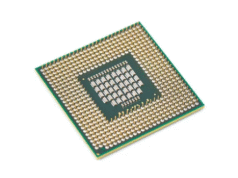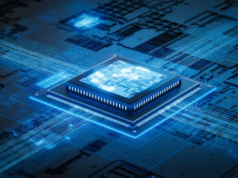When most people think about upgrading their computer, they focus on flashy specs like screen size, graphics cards, or RAM. But if there’s one component that truly defines the speed, responsiveness, and performance of your device, it’s the CPU—the Central Processing Unit. Often referred to as the brain of your computer, the CPU is responsible for executing instructions, running programs, and managing operations that make modern digital life possible.
This article will break down why the CPU matters more than you think, how it impacts everything from boot-up time to multitasking, and why it should be at the top of your checklist when choosing any device—from a smartphone to a high-performance gaming PC.
What Is a CPU, Really?
At its core, the CPU is the command center of any computing system. It processes instructions from both the operating system and software applications, performing calculations and making decisions at lightning speed.
Every click, tap, swipe, or keystroke triggers a series of operations that the CPU must process. The more powerful the CPU, the faster and more efficient your device becomes.
How the CPU Impacts Everyday Computing
1. Boot-Up Speeds and Overall Responsiveness
A slow CPU will drag down your entire system. If you’ve ever waited ages for a device to boot or for apps to launch, your CPU might be to blame. A faster processor translates into quicker start-up times, smoother transitions, and an overall snappier experience.
2. Multitasking Made Easy
Do you run multiple applications at once—like streaming music, browsing the web, and editing documents? A modern CPU with multiple cores and threads can handle simultaneous tasks without freezing or crashing. The more cores and threads, the better your system manages multitasking.
3. Gaming and Graphics Performance
While the GPU (Graphics Processing Unit) gets most of the attention in gaming, the CPU plays a vital role too. Many game engines rely heavily on the CPU to calculate game logic, physics, AI behaviors, and background processes. A weak CPU can bottleneck even the most powerful GPU, limiting your frame rates and visual performance.
4. Software and Application Performance
Whether you’re editing videos, crunching data, or running virtual machines, the CPU is the workhorse. Applications like Adobe Premiere Pro, AutoCAD, or even Excel spreadsheets with thousands of rows depend on strong CPU performance for fast rendering and efficient processing.
5. Web Browsing and Online Workloads
Every tab you open in your browser is a separate process. Open too many tabs, and a weak CPU can struggle to keep up. If you’re a student, remote worker, or content creator, having a good CPU ensures smooth web conferencing, faster searches, and seamless cloud-based work.
The Role of CPU in Modern Devices
Desktops and Laptops
In desktops and laptops, the CPU is often the most expensive and crucial component. It determines how well your device handles tasks like gaming, streaming, design work, and running complex apps.
Smartphones and Tablets
Mobile CPUs (often ARM-based) prioritize power efficiency, but they’re now catching up in performance too. Today’s smartphone CPUs are capable of handling AI tasks, photography enhancements, 4K video recording, and even console-level gaming.
Servers and Data Centers
In cloud computing and enterprise environments, CPUs are optimized for handling millions of simultaneous operations, managing databases, and processing huge data sets. Faster CPUs translate to faster services and lower costs.
Key CPU Specs That Matter
To understand CPU performance, here are the core specifications you should pay attention to:
1. Clock Speed (GHz)
Indicates how fast a CPU can process instructions. Higher isn’t always better, but it’s a useful baseline.
2. Cores and Threads
Modern CPUs come with multiple cores (independent processing units) and threads (virtual cores that help with multitasking). More cores and threads mean better parallel processing.
3. Cache Size
The CPU cache stores frequently used data. A larger cache reduces the time needed to access that data, improving speed.
4. Architecture
A CPU’s underlying architecture (x86, ARM, etc.) impacts power efficiency and compatibility. For instance, Apple’s switch to ARM-based M1 and M2 chips drastically improved performance per watt.
5. Thermal Design Power (TDP)
This measures how much heat the CPU produces under load. A lower TDP means better energy efficiency—important for laptops and mobile devices.
Why CPU Upgrades Deliver the Biggest Boost
Upgrading your CPU can often lead to the most noticeable improvement in system performance, especially if:
- Your current device struggles with multitasking.
- You use performance-heavy apps like Adobe Suite or video editing software.
- You’re a gamer suffering from frame drops despite having a good GPU.
- You want your device to remain usable for years to come.
Unlike adding RAM or switching to SSDs, upgrading the CPU can drastically improve how your system thinks, not just how it stores or retrieves data.
CPUs in the AI Era
With the rise of artificial intelligence, CPUs are evolving. They now often come with integrated AI accelerators to handle machine learning tasks locally. This is vital for real-time features like voice recognition, face detection, and predictive typing.
In tandem with GPUs and NPUs (Neural Processing Units), CPUs are enabling everything from smart assistants to autonomous vehicles to function smoothly and securely.
The Future of CPUs: Why It Still Matters
Some believe that GPUs or specialized chips like Apple’s Neural Engine will eventually replace CPUs. But the truth is, the CPU remains central to every operation in a device. It’s the first and last component that processes tasks—coordinating with memory, storage, and peripherals.
Future CPUs will likely focus on:
- Greater energy efficiency
- AI-enhanced instruction handling
- Integration with other processing units
- Smaller nanometer manufacturing processes for higher density and performance
Conclusion: Don’t Underestimate the CPU
While other components may be more visible or hyped, the CPU is the silent workhorse that powers every digital action you take. From streaming videos to launching rockets, every modern system depends on a capable CPU to function efficiently.
So next time you’re shopping for a device—or wondering why yours feels slow—remember: the CPU isn’t just part of the computer; it is the computer’s brain. And just like in real life, everything starts with how well that brain works.
Would you like a downloadable buying guide for choosing the right CPU for different use cases like gaming, productivity, or mobile?
Also Read :
- CPU Architecture Explained: x86, ARM, and Beyond
- What Makes a CPU Fast? Understanding Clock Speed, Cores, and Threads
- The Evolution of the CPU: From Single Core to Multi-Core Monsters
- CPU vs GPU: What’s the Difference and Why It Matters
- What Is a CPU? A Beginner’s Guide to the Brain of Your Computer
















